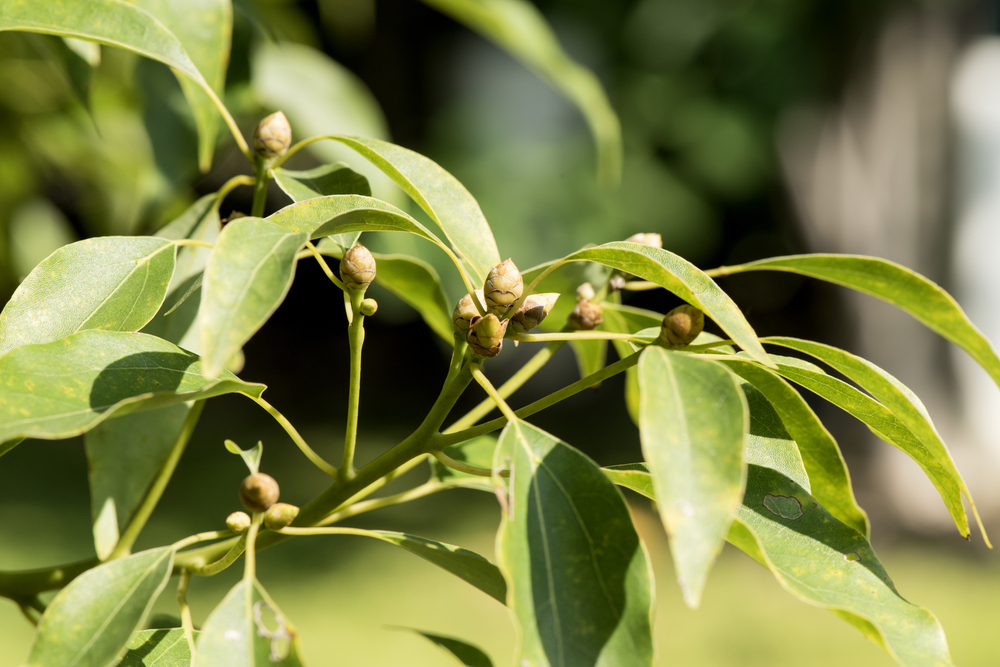Description: Niaouli is a large evergreen tree that is native to Australia. It has five-inch long leaves and white-yellow flowers that blossom in tight spikes. Due to its flaky look, the tree has been given nicknames including bottlebrush, paperbark, and paperbark tea tree. The niaouli leaves and bark were commonly used by Indigenous Australians for various purposes including teas, basketmaking, and flavoring.
It is a naturally stimulating essential oil because of its eucalyptol content and composition of monoterpenes. Its chemistry makes it a pleasant complement to a soothing massage or diffuser blend. Because of its powerful properties, Niaouli essential oil can support the maintenance of healthy-looking mouths and skin when diluted properly. It can also work as an effective addition to a cleaning spray by improving its cleansing benefits.
Here are some key features and uses of Niaouli essential oil:
- Aroma: Niaouli Essential oil has a fresh, sweet, and camphoraceous aroma with hints of citrus notes.
- Respiratory Support: Niaouli Essential oil is used to support the respiratory system. Its expectorant properties can help alleviate congestion and ease breathing. It may be beneficial in managing conditions like coughs, colds, sinusitis, and bronchitis.
- Immune Support: The oil has antimicrobial properties that may help in boosting the immune system and fighting against various infections.
- Skin Care: Niaouli Essential oil is used in skincare due to its antiseptic and anti-inflammatory properties. It can aid in treating skin conditions like acne, wounds, and insect bites. However, as with any essential oil, it should be used with caution and properly diluted before applying to the skin.
- Aromatherapy: The pleasant aroma of Niaouli essential oil makes it a popular choice in aromatherapy. It helps to promote relaxation, reduce stress, and improve mental focus.
- Insect Repellent: The oil’s strong aroma can also be used as a natural insect repellent
Botanical name : Melaleuca Viridiflora
Plant Part: Leaves
Extraction Method: Steam distilled
Odor and Appearance: Pale yellow to clear liquid with a fresh, sweet, and camphoraceous aroma
Country of origin : Madagascar
Main Constituents: 1,8-Cineole (Eucalyptol), Alpha-Pinene, Limonene, Alpha-Terpineol, Viridiflorol, Terpinen-4-ol, Gamma-Terpinene, and Piperitone
Common Uses: Niaouli Essential Oil is used to support the respiratory system. The oil’s strong aroma can also be used as a natural insect repellent. It is also used in Aromatherapy, Skin care
Note: Niaouli essential oil has a unique and distinctive aroma with various aromatic notes. The overall scent profile is considered fresh, sweet, and camphoraceous, similar to other essential oils in the Myrtaceae family, such as eucalyptus and tea tree oil
Blend Well With: Niaouli Essential Oil naturally blends well with Eucalyptus, Tea Tree, Lemon, Peppermint, Lavender, Rosemary, Cypress, Geranium, and other essential oils.
Contraindications: Niaouli essential oil is considered safe to use. Just like many other essential oils, it is wise to use this oil after dilution with a carrier oil, as it can be sensitive and irritating to the skin. Before you use Niaouli essential oil on your skin, it is advisable that you conduct a patch test before making it a routine.
Do not use internally, unless directed by a physician. For pregnant women and nursing mothers, it is safe to consult first with your physician before using Niaouli Essential Oil. Do not use on broken skin or on abrasions.
*These statements have not been evaluated by the Food and Drug Administration. This product is not intended to diagnose, treat, cure, or prevent any disease.*
For large quantities please contact us via our phone number or through the Contact Us page.
Like us on Facebook.







Reviews
There are no reviews yet